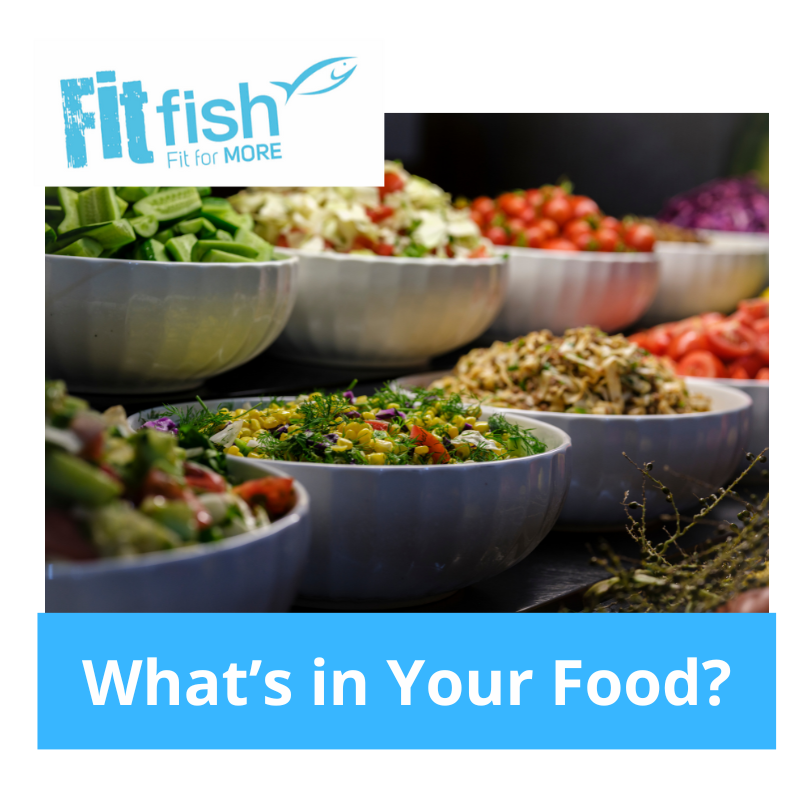What’s in Your Food: Understanding the Components of Your Diet

In our fast-paced world, it’s easy to forget to pause and think about what we’re putting into our bodies. The other night I woke up with a stomach ache and sickness – not ideal! I thought I had some kind of bug, but then realised I’d eaten something I’m sensitive to – MSG. It hadn’t happened for a while because I know to look out for it, but it was labelled generically as ‘flavour enhancer’, and it was only going to the company website the next day that I found what it actually was.
I’ve learned a lesson that MSG is not classed as one of the main allergens and so may not always be obvious from a food label. And this unpleasant experience reminded me that it can be helpful to revisit what’s in our food!
Our food choices have a profound impact on our health, and being aware of what’s in our food can help us make more informed decisions. In this video and blog post, we’ll explore the various components that make up the food we eat and why it’s essential to choose non-processed options whenever possible.
1. Nutrients
The foundation of our diet consists of nutrients – the essential building blocks that keep our bodies functioning optimally. These include proteins, fats, carbohydrates, vitamins, and minerals. Each nutrient plays a unique role in supporting our overall health. Proteins are essential for tissue repair and growth, while fats provide energy and help with nutrient absorption. Carbohydrates are our primary energy source, and vitamins and minerals are involved in various bodily processes.
2. Naturally Occurring Non-Nutrient Compounds
Beyond the essential nutrients, food contains naturally occurring non-nutrient compounds like flavonoids and phytosterols. These compounds often have powerful health benefits. For instance, flavonoids are known for their antioxidant properties and are found in foods like fruits, vegetables, and tea. Phytosterols can help lower cholesterol levels and are found in plant-based foods like nuts and seeds.
3. Naturally Occurring Toxins
While it might be surprising, some foods contain naturally occurring toxins. For example, almonds contain a small amount of hydrogen cyanide, and peanut butter may have aflatoxins, both of which are potentially harmful in large quantities. However, these toxins are typically at such low levels that they pose no significant health risk when consumed in moderation.
4. Intentionally Added Foreign Compounds
In processed foods, you’ll often find intentionally added foreign compounds like preservatives, colourants, and flavourings. These substances are used to enhance taste, appearance, and shelf life. However, some of these additives may have adverse effects on health, and it’s crucial to read food labels and make informed choices.
5. Industrial Pollutants
Industrial pollutants, such as heavy metals and polychlorinated biphenyls (PCBs), can find their way into our food supply. Seafood, for example, may contain traces of mercury, a heavy metal. To reduce exposure to industrial pollutants, choose sources of food that are known to have lower contamination levels and follow government advisories.
6. Microbiological Factors
Foodborne pathogens and commensal bacteria can also affect the safety and quality of our food. Proper food handling, storage, and preparation are key to preventing foodborne illnesses. This includes practices like washing hands and produce, cooking food to the appropriate temperature, and storing perishables at safe temperatures.
7. Other Chemical Residues
Chemical residues like antibiotics, insecticides, fungicides, and herbicides can be present in conventionally grown fruits and vegetables. Choosing organic or pesticide-free options can help reduce exposure to these chemicals. Washing produce thoroughly is also a good practice.
In conclusion, understanding what’s in your food is the first step towards making healthier choices. Opting for non-processed foods, such as fresh fruits, vegetables, whole grains, and lean proteins, can help minimise exposure to additives, toxins, and pollutants. Remember, your food choices are an investment in your long-term health, so choose wisely and savour the benefits of a nutritious and wholesome diet.
By making informed decisions about what we eat, we can take better control of our health and well-being. Is it time to be more conscious about “what’s in your food?”
One of the most helpful things we can do for our health is to be mindful about what we eat and thinking about our meal choices ahead of time when we are not rushed or stressed is a major component of this.
Our Meal Planning Masterclass and accompanying database is now available to do at any time! https://www.register-fit-fish.co.uk/meal-planning-masterclass
Comments
Add comment